#the gifted meta
Explore tagged Tumblr posts
Text
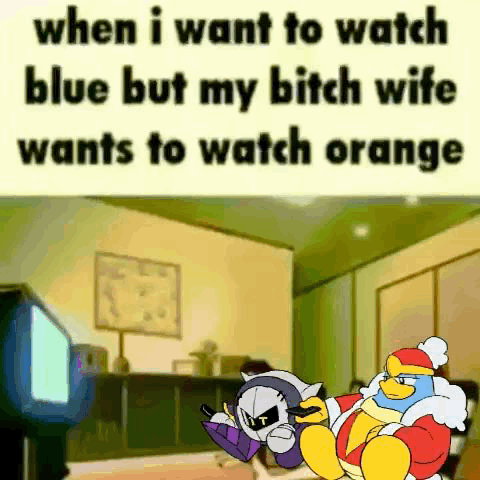
This is what happens inside the buddy towers while they wait for Kirby, me thinks
Based on this post I made about Dedede watching TV and this amazing tag someone reblogged it with

#kirby#kots#kirby of the stars#kirby fanart#hoshi no kirby#king dedede#meta knight#kirby meme#metadede#Kirby fighters 2 is forever the gift that keeps on giving#on other news i finally learnt how to make animations on clip studio#does anyone know how to upload gifs to the gif machine im computer illiterate#meta knight’s love language is fighting#dedede is just stubborn and gets actually pissy#do you know how hard it is to accommodate kirby characters on a base for a meme#with their weird anatomy and lack of limbs#meta knight can’t sit crossed legged and dedede doesn’t have knees#so i did my best#if someone already drew this meme im so sorry#i just fucking realized i fucked up dedede’s clothes in the last frame i may as well end it all
1K notes
·
View notes
Text
the more I play the more I think lucanis basically knows it's illario who betrayed him right from the beginning (he's had a year in the ossuary to think. not that many people knew where he was going. when you ask him 'did Illario know you'd be on that ship' his only answer is the hardest flattest 'yes' you ever heard). so it's not so much about figuring out who the traitor is (because that's ludicrous. we all know. immediately. they didn't really bother to hide it lmao) as about methodically closing off every single avenue of denial lucanis has clung to that whole time with as much or little gentleness as you might prefer until he has no choice but to admit it. because the moment he has to admit it, he'll have to do something -- feel something -- about it. and that's such a catastrophic event in lucanis' inner landscape (he has had TWO people in this whole entire world up until now and will do anything to hold on to them with a heartbreaking child-like desperation, even at and especially through the detriment of his own self) that he'd rather just. not. what if we quite simply. didn't. what if we just stayed here in the emptiness where we can both pretend you didn't hurt me in a way I should never forgive. I have so much practice in that with caterina already it's always worked out great for everyone so far. (press x to fucking doubt but that's trauma logic for you lol)
after everything illario did, so much of the storm of lucanis' emotions around it is 'what the FUCK did you get yourself tangled up in this time and how do I get you out of this mess safely'. what's worse: the fact that your brother murdered you, or that he put himself in horrible danger doing so and thus exposed you to the risk of losing him forever. lucanis' heart certainly has an opinion here and it's fucking unhinged (affectionate)
the themes of dissociation in lucanis' character in general makes me feel nuts. allllll these contradictory messy things he needs to cut off from each other because they can't coexist or be easily reconciled inside him. but all remain stubbornly true separately anyway and will have their due one day. love and resentment. tenderness and fear and rage. terror and longing. love and freedom don't coexist. the burned out golden child anthem is playing in the background. he was always caterina's favourite and he has to keep striving to deserve that dubious honour with every breath he takes and then, presumably, mercifully, some day he will die and be excused and can rest. and until now he's suppressed all the -- natural, healthy, protective! -- negative feelings that threaten the few attachment relationships he actually has, at the cost of ever actually having his needs for connection and safety met and leaving his core self imprisoned and compromised. and spite goes 'what. no. that's dumb fuck that' (*spite voice* I do not understand that and even if I did I would not respect it) and does not allow him to fall back into that, which I think is what saves his life, ultimately. it took being possessed by a demon for lucanis to even contemplate telling anyone he loves 'no' in any way, but hey. whatever gets you there right lol
lucanis is dealing with the freeze response allll the way down baby. and he was even before the ossuary, that just turbo powered it and brought it to a breaking point way before it could happen naturally. but something was going to break eventually no matter what, and I'm just glad that in the end, through the power of friendship and also pure spite, it doesn't have to be him
#I am worried about him all the time. but also: his found family of godslaying maniacs and also the power of love. there are reasons to hope#when there was only one set of footprints in the sand that was the veilguard party holding lucanis in their arms#and going 'excuse you he said no FUCKING pickles!!!' while he's like '🥺should you guys really be -- ' 'YES'#dragon age#dragon age: the veilguard#dragon age: the veilguard spoilers#dragon age spoilers#lucanis dellamorte#dragon age meta#there's some messiness to his arc but what mary kirby managed to capture here about how this works. is everything to me#he is so exactly for me. I'm sorry for all the people he turned out not to be for. but not for him being for me#the gift of looking at him and hearing 'you're more than what you're going through' and be forced to annoyedly go 'okay#MAYBE that could be also be true for me. maybe.' he's going through it. and also so much more and the funniest person in the world#he's so worth it to still have in the world!!!!#I'm so glad we don't get to 'fix' his relationship with his family and especially caterina actually#that is stuff that would need to happen on a time scale waaay outside of the one in this game#and there's Something very real in having to go 'this is not for me to decide for you. who you love and what you do about it is yours'
1K notes
·
View notes
Text
Ideology of Exceptionalism and Gravity Falls; meta and character analysis

I had a whole ago read a post by @icanlife that had a quote by Alex Hirsch on Ford's greatest flaw, and wanted to explore what the flaw is, which is the ideology of exceptionalism; in the exploration, I’ll touch on what it is and how it is used in abusive relationships and cults, as well as how it drives multiple Gravity Falls characters and consequently how it impacts relationships between these characters, and how the show ultimately refutes exceptionalism.
Quick note here; I am not in any way, shape or form a psychologist nor have any formal training in psychology; this is written from my own experiences with this ideology and my own forays into psychology and trauma-informed learning. It is also written with a loose understanding that is likely not broad enough to cover all references to cults, extremist groups and abusive relationships.
The Ideology of Exceptionalism
First of all, we have to get through a drier bit, which is… what is the ideology of exceptionalism and how does it arise? Might be fairly obvious, but it is the belief that you are, or belong to, a group of exceptional people, thus more important and worth more than anyone else; ie, those who don't qualify as 'exceptional'. It is often a subconsciously learned ideology. Now, what qualifies one as exceptional can be extremely varied; generally it revolves around something that provides some form of privilege. Thus, it might be, as the main exceptionalist idea in Gravity Falls, 'intelligence', or power, or it can be such things as attractiveness, quantity of money one has, species, nationality, or skin colour and ancestral heritage. The ideology of exceptionalism, being by nature hierarchical, devalues, and at its worst, openly and violently dehumanizes those who do not qualify as exceptional.
For why exceptionalism occurs is an extremely broad topic, but I've personally found that, for exceptionalism revolving around intelligence, it's a result of a poor sense of self-worth, and having one's self-worth tied to what makes one exceptional. Poor self-worth itself (again, broadly) is a result of childhood trauma from a lack of positive affirmation and unfulfillment of the emotional needs of the child. Meanwhile, self-worth becoming tied to the quality of exceptionalism generally is a result of when positive affirmation was pretty much solely provided around their 'exceptionalism', especially when provided derogatory commentary, or a blatant example of how they would be treated if they aren't 'exceptional'. As a result of the general lack of affirmation, self-worth then becomes often solely reliant on the qualities of exceptionalism, as that is the only way for the child (and later, adult) to get affirmation of their worth, as well as out of fear of being ‘not worth anything��� like the examples of ‘non-exceptional’ people they have been given.
This is especially likely to occur when the child is a social outcast; the adoption of the hierarchical ideology of exceptionalism, and the devaluation/dehumanization of others often occurs subconsciously as an avoidance/minimization tactic from pain. This is to say, the child, and later the adult (if healthy self-worth is not established) goes 'it doesn't matter what the non-exceptional people say or if they accept me since I matter more than them because of my exceptionality'. It can even be taken further, that being shunned is part of one's exceptionalism, and becomes part of the qualifier of being exceptional. For instance, 'they just can't understand because they aren't exceptional and that's just a part of being exceptional'. This idea also neatly tailors into the part of the concept of being better then others means you are separate from others; this can be taken that someone who is special, needs to be alone to be truly special.
Obviously, exceptionalism is not a healthy coping mechanism for poor self-worth, as often such people constantly feel the need to prove and show off their exceptionalism to gain that affirmation and avoid rejection, which is stressful. As well, it often negatively impacts their relationships with other people as a result of the arrogance of believing that they are better than most others, or even deliberate sabotage due to their arrogance. This occurs as they flatten the complexity of human experience to black-and-white hierarchical categories of exceptional/not-exceptional through constant judgement of those they meet, and often refuse to engage with people who don't belong to their 'exceptionality', or even people they simply don't like, even if they technically qualify. Generally, those that they do like or have close relationships with, often due to being similar, are automatically labelled as 'exceptional'. Those judged as ‘exceptional’ also become privy to the open judgements of ‘non-exceptional’ others, out of a subconscious belief by the exceptionalist that the other believes similarly; something that may strain their relationship if the other doesn’t ascribe to exceptionalism. This all culminates in the exceptionalist being blind or even adverse to the diversity of experiences, which makes it difficult to create relationships and community outside of echo chambers of their own beliefs (if they can even find this), and subsequently, these people are often isolated and have very few to no close relationships with people.
However, all humans require connections with other people, relationships where one can rely on others emotionally and physically if needed and feel accepted; they also require to feel like they are worth something, that their life has meaning. Lacking meaningful connections and having a crippled sense of self-worth, a deep yearning hole is left in these people. Exceptionalism, especially as it is a narrative constantly pushed by Western society as it validates hierarchies, is then employed as a (often subconscious) trauma response to assuage this yearning hole, with arrogance and denial. And depending on the circumstances, it can be a very strong and definitive trauma response for people.
This isolation and lack of self-worth is catnip to abusive relationships, including cults and extremist groups. These types of relationships often heavily rely on isolating their victims or pulling them into echo chambers of solely the abuser’s rhetoric, to redefine what is healthy through gaslighting; as the exceptionalists are already isolated, this makes them extremely susceptible. They also often provide these people affirmation, and in these cases especially about their exceptionalism, thus confirming their self-worth, their 'specialness', while also providing them the connection they have been lacking, either through the cult community or through the abuser’s own presence. These emotional needs, which haven’t been met in a long time, if ever, begin to be fulfilled; something that abusive relationships and cults hinge on, rather than any form of logic.
Ideology of Exceptionalism and Gravity Falls
The main characters within Gravity Falls which are heavily ascribed to exceptionalism would be both Ford and Bill; this characterization deeply impacts the story and their relationships with others (technically the Northwest are another case regarding wealth, but less directly impact the storyline and thus tangential; Gideon also is an example, but as a mirror of Bill). With each of these characters I’ll go into detail within their sections on the way they began to ascribe to exceptionalism, and how it plays out later in their relationships; I will first begin with Ford, then move to Bill. Then, to cap it off, I’ll go into the characterization of Stan and the way Gravity Falls refutes exceptionalism.
Ford and Exceptionalism
Firstly, the quote from Alex Hirsch that kicked this whole baby off, as mentioned previously;
“Ford sees Dipper as someone who’s special like himself. That’s Ford’s great flaw, his arrogance is he believes that there’s special people, and everyone else. That human attachments are actually weaknesses. And the song and dance that he’s giving Dipper right now, is the song and dance that he gave McGucket, back when they were younger… ‘You and me are different, we’re better than everyone else. We have a path that no one else can understand, and only us can do this.’ It’s a very seductive idea for Dipper… Dipper is a smart kid, but Ford’s projecting. Ford loves Dipper because he sees someone who’ll tell him ‘yes’ to everything. Who’ll never challenge him, who’ll do a really insane dangerous mission.”
Very blatantly Alex Hirsch calls Ford out on his arrogance in the belief that he is special, in his belief in the 'lone hero' complex, in his belief in exceptionalism. And really, it should be no surprise that Ford does so, considering the way he's depicted as a social outcast as a child (other than Stan), and the way his parents have been clearly shown to be not particularly emotionally supportive (“I’m not impressed”); they don't provide positive affirmation except for his intelligence (mostly due to the possibility of money making through it…), while also actively comparing him to Stan who is derogatorily ‘not-exceptional’, and ‘worth less’. This all sets Ford’s self-worth up to be fragile, and other than Stan who wholeheartedly accepts him, he is isolated and invalidated; plus, the only other validation he receives is around his intelligence. All very classically fitting the profile for exceptionalism.

Image id: Stand and Ford when they were children, both clearly enjoying each other's company.
Ford’s belief in his exceptionalism catalyzes after the shattering of his and Stan’s relationship. Previously the twins are shown to do everything together, having a very close caring relationship; something unlikely if Ford thought he was better than Stan. Also, when Ford is talked to about his opportunities, Ford looks uncomfortable at the way they talk about Stan as inferior, compared to how he himself is being praised; but in the offer he’s simultaneously finally being validated, he’s being told he’s someone worth something, and he’s going to be someone worth something after this. And then the science fair incident occurs, and Ford loses that validation from his parents, from the judges and a future of more validation; after being promised validation and acceptance, it slips through his fingers. And in his anger of being denied that, it becomes easy to begin to slip subconsciously into the rhetoric the others have been feeding him; that he’s exceptional, that Stan isn’t, and he deserved to be recognized for his worth. So he breaks the relationship with the only person who accepted and validated him for who he is. With that loss of previous support, Ford becomes then deeply obsessed with proving his exceptionalism to the world to assuage that fragile self-worth, to become accepted, or even better, revered, confirming that he is someone of worth, someone special, like he was promised.
Ford’s obsession also doubly functions as a way to alleviate his guilt over shattering their relationship; if he’s exceptional as he believes, then he’s within the right to respond the way he did, as he’s worth more than Stan, he's better off alone, and he has a right to be angry over being denied that validation. As well, in much the same way as it is used as a way to alleviate his guilt over the end of their relationship, it is also likely used in a way to minimize the pain of being ostracized (although not directly depicted); afterall, Ford’s keenly aware and insecure about his social ineptitude and his six fingers as things that make him different from other people, case in point with his experience visiting Lazy Susans Diner. Thus it wouldn’t be unsurprising if he uses the idea of being worth more than those who ostracize him to imply it ‘doesn’t matter’ what they think. His ostracization by nature keeps him from generally forming close relationships, with the exception of Fiddleford (who much like him, is socially outcast, and intelligent) during his university days. As a result, he's isolated and acutely lonely, having lost Stan.

Image id: One of the missing Journal 3 pages in TBOB, detailing Ford's botched social interaction in Lazy Susans Diner. In the background is the print of his six-fingered hand.
In his obsession over being acknowledged, Ford, like many others who believe in exceptionalism, identifies strongly with the causes of his ostracization (his intelligence, his six-fingeredness) as part of, or wholly, makes him exceptional. It is obvious through his choice of study; with the grant he has been gifted, he chooses to revolve his work around the weird, the outcast, something that you see Ford gravitate towards being an outcast and deemed 'weird' himself (which in Journal 3 he openly talks about). Something that can be, much like him, framed as 'exceptional'. His work is even recorded in a journal that Ford deliberately chooses to put his six-fingered hand on the cover of. Intertwined with the way it becomes adopted into the idea of exceptionalism, is the keen loneliness from his ostracization and a deep desire to be accepted and a wish to find a community of other weird people.

Image id: Two pages from journal 3, labelled 'Myself', in which Ford is open about being weird, and a social outcast, while also noting his ambitions and that 'Gravity Falls, [is] the place that I fit in.'
Ford and Bill
All of this culminates in Ford becoming an incredibly easy target to manipulate by Bill. He’s desperate to be acknowledged (and thus accepted) by an authority figure so that his belief in exceptionalism is justified and his self-worth confirmed. And he knows he’s intelligent, that he's exceptional because people have told him so, but he just needs to prove it with something that shakes the world. And the grant is finally his second chance after the fair, but he's stuck, and the research is going nowhere, and he's in a town where he doesn't really know anyone and he’s so terribly lonely. And sure, he clings to his exceptionalism but if he can't even prove it then is he really exceptional? Is he even worth anything like he thought he was? And what about what he's left behind, rejected, because of his exceptionalism?
And THEN he finds an incantation and he ignores the warnings because maybe, just maybe, this will be his break to get that acceptance/validation he has been chasing his whole life?
And then it's better than that.
A god, essentially, shows himself to him, an ultimate figure of authority. And he tells him that yes, he is special, he’s worth more than other people, and Bill’s only showing himself to Ford because he is so much more intelligent than anyone else. Ford is suddenly getting his exceptionalism confirmed by a god of ancient knowledge, an immensely intelligent interdimensional being, and he’s also showering him with affirmations, specifically affirmations around what Ford's fragile self-worth is based on. And even better, he's delighted by Ford's six-fingeredness; he's not put off at all, it even becomes his main nickname for Ford, just like it used to be for Stan all those years ago. On top of it all, Ford's own social ineptitude doesn't phase Bill, another thing Ford is self-conscious about; Bill's own social ineptitude as he's not human probably makes Ford feel comfortable, knowing that's not expected from him.
Through Bill, not only does Ford find someone who validates his self-worth through intelligence and even confirms to him that his weirdness is part and parcel of making him special, he also finds someone who he regularly (generally) is in contact with, who enjoys talking to him and even banters with him familiarly. Hell, Bill even deliberately goes out of his way (literally possessing a whole wack ton of rats, then dream karaoke) to celebrate his birthday with him; how long do you think Ford has simply skipped his birthday since he had no one to really celebrate it with? The loneliness, beneath his arrogance and belief in exceptionalism, is being fulfilled; for the first time since Ford was a teenager, he's fully accepted by someone, social awkwardness, six fingers, exceptionalism and all.

Image id: One of the lost pages from Journal 3 in TBOB, the 'one thing led to another' page, with Bill and Ford singing karaoke and drinking together, both clearly enjoying themselves; Bill has an arm slung around Ford's shoulders.
So it's really no surprise at all that Ford fell for this, hook line and sinker. Hell, if I was in Ford's shoes I would fall for it just as hard. And I've seen a few posts floating around talking about how Bill is bad at manipulating, and no, he's not. He was able to pinpoint exactly what Ford wanted and needed, and provided that, was charismatic enough to provide that. Again, manipulation isn't about logic. It really isn't; it's about the emotional core in people, what people lack and what you can give them to slowly reel them in to sing your dance and song. And people will ignore vast swaths of red flags when you're finally being accepted, when you're finally getting your emotional needs met at least in some way or form. It's better than not having them met at all, such as previously. So Ford worshipping Bill is really not a surprise, especially as Bill deliberately stoked it.
All of this is part of why you see Alex Hirsch call Ford's belief in his exceptionalism his greatest flaw; because it allowed him to be very easily manipulated by Bill, and by its nature kept Ford isolated from others, evident by his arrogance in assuming he knows best and refusing to see other people who aren't as 'intelligent/weird' as him as worth getting to know, listen too and even reach out to ask help from, it's him believing he has to be the lone hero as someone whose 'special'. It's something that blinds him to the danger of his work around the weirdness of gravity falls because he’s desperate to seek a place where he and his weirdness belong, and it's something that plays out in each and every relationship he has because it's something he clings to so deeply. It's what cost him his relationship with Stan, who previously accepted him completely, and, as he's disinclined to form new relationships and as Bill actively strokes his paranoia (Trust No One…), ultimately further increases the hold Bill has over him. It's only Fiddleford’s presence as he works with Ford that allows him some form of outside reference and reprieve from solely Bill’s influence, something that Bill resents deeply and is clearly jealous and angry about, even if Fiddleford is helping create the portal. And it's ultimately Fiddleford, once he was aware enough of what was happening, calls Ford out on it, seriously jeopardizing Bill's influence over Ford; but Ford is too invested in the portal, in chasing his own ambition and caught up in Bill’s manipulation to take him seriously, until the incident with the trial, and Ford beginning to hear other voices then Bill.
Ford’s Exceptionalism and Wider Relationships
Now back to how it plays out in all Ford's relationships; we've already gone over it with Bill's influence, because it made him extremely easy to manipulate, and with his disregard of Stan in favor of validation of his exceptionalism. But Ford, as pointed out by Alex Hirsch, also exerts the ideology's seductive rhetoric to both Fiddleford and Dipper (who look up to Ford) in a similar way that Bill does with him (although there is a difference of it being used intentionally and maliciously, compared to subconsciously and earnestly, even if it is problematic). Ford, with his black-and-white view of exceptionalism, sees both Fiddleford and Dipper as people who are like him; 'exceptional', and so he treats them as such, and uses this rhetoric to coerce them into helping him.
For Fiddleford, the lure is how he can change the world, how he can be finally acknowledged if he helps Ford with the portal. And it works well; he willingly chooses to leave his own work and his wife and young son, to work with Ford. Much like Ford, Fiddleford himself is also a social outcast and regularly presumed less smart than he is, and he’s got a chip on his shoulder to prove himself, to gain acknowledgement and recognition from the world at large. Although Fiddleford has a family which presumes he’s not entirely lonely like Ford is, he also clearly has deep feelings for Ford, some which are hinted to be more than just ‘friendly’ feelings; it is likely the combination of the lure of validation and spending time with Ford, a kindred spirit that accepts him and an old friend/crush, that causes him to agree (afterall, it was Ford who made Fiddleford feel accepted and choose to stay at Backupsmore). And Fiddleford’s not even considered a partner, but rather an assistant to Ford due to Ford's arrogance, and he still drops everything to go! It’s more about their relationship and connection rather than validation, but that doesn’t stop Ford from espousing exceptionalism. And this is a distinguishing difference, because although Fiddleford would like recognition, he’s not there solely because of it; he’s not a believer in exceptionalism nor arrogant about his skills, and so, unlike Ford who is blinded by his obsession, he’s much more aware of the dangers of the weirdness of Gravity Falls. Thus, he's actively calculating the risks involved, and when he realizes there could be potentially devastating consequences of the portal, he attempts to talk Ford out of it; this fails due to Ford’s own denial and obsession over the portal. In the end, it all goes terribly sideways, and Fiddleford ends up losing everything he had; his wife, his son, his friend, his memories and himself to the trauma he had experienced at the invitation of his friend with the lure of validation and company, due to the memory gun he had created himself.
As for Dipper, much like Ford, he also has issues with self-worth (many of the episodes deal with Dipper finding self-worth; ie, the manotaur episode), has a physical oddity (his birthmark) and by far the trait he relies on most for worth is his intelligence (for example, in one episode he rubs it into Mabel's face over and over again in beating her in games). He's also extremely desperate to be recognized by authority figures as someone intelligent, case in point when he summons the dead after being made fun of by the government agents to try and show them that the information he's gathered is important after Stan dismisses his knowledge. This desperation to be seen as someone of worth from Dipper, much like Ford, extends to the need to be a hero, something he even says at the end of the zombie episode; yet, due to Mabel, unlike Ford he's not a lone hero, and Mabel also half the time acts as the hero.

Image id: Zombies crawling out of a crack after Dipper summons them; Dipper and the two agents look on in horror.
It all culminates in Dipper hero-worshipping Ford when he returns; really, no different than Ford worshipping Bill. And Ford clearly finds it extremely flattering; Dipper's attention and amazement of him feeds his exceptionalism. Exactly how Ford responded to Bill, Dipper is willing to do anything for Ford, excited too, in an attempt to impress Ford and be validated and accepted. And for Ford, that's an extremely heady feeling, especially as someone who has been constantly alone the last 30 years, especially when he had one previously confirm his exceptionalism all those years ago and stopped, and now someone is once again affirming that idea. And Ford doesn't have to be alone again, because he's found a kindred spirit in Dipper as his assistant, someone ‘just’ like him, someone who is exceptional. Because he sees himself in Dipper, he begins to espouse exceptionalism unconsciously, by praising Dipper's own intellect and adventurous spirit, assuaging his feeling of self-worth, while also telling him he's more important or better than others because of it.
And it's seductive to Dipper, because he wants to hear those affirmations of his self-worth, especially as he hero-worships him, but Dipper isn't sold on it, because it means leaving Mabel behind, it means believing that he's worth more than Mabel (and also, Stan, and all his friends he’s made in Gravity Falls). It's ultimately because of his relationship with Mabel that he rejects the ideology; he's not isolated the way Ford was with Bill, and he's not willing to break that relationship for that acknowledgement, because his relationships matter more to him.
Bill and Exceptionalism
Now of course, that's only on the Pines; what about Bill?
While it's obvious that Bill uses exceptionalism as a main manipulative tactic, it's not just an ideology he sprouts emptily; it's also an ideology he believes in, just like Ford, although it's less based on intellectual exceptionalism, and more on power and 'weirdness'.
This most distinctly can be seen in Bill's denial about what happened to his home dimension; Bill's belief in his exceptionalism occurs as a pain avoidance tactic from killing his whole dimension. Bill was clearly a social outcast within his dimension due to being able to see 3d; he's not accepted, and not trusted, to the point that there is medical intervention to make him blind. That's a deeply traumatic experience that completely erases one sense of self-worth, where one’s sanity is called into question by your parents on something that is not harmful, that's beautiful and you just want to share with them. It's a deep and clear rejection of who Bill is, and his ability. As a result, out of a desperate bid to be understood and accepted, he ends up trying to show them the stars. And it ends up killing everyone.

Image id: Page of TBOB, on 'The Early Years' which notes that Bill was an oddity for seeing 3d, something that was illegal to speak about. Bill frames it as something that made him 'special' and better than all the others.
Traumatized, and originally rejected by the dimension, he instead weaves an excuse of exceptionalism; that it doesn't matter what he did to them because he's exceptional and he's worth more than all of them because he can see 3d, because he's powerful, so he shouldn't/'doesn't' feel any remorse about it. With such a traumatic result of trying to be accepted by people, he rejects the idea of trying to be accepted for who he really is; instead adopting a facade of a monster that he believes he is (and eventually, becomes).
Even if he clings to the delusion of exceptionalism, and shuns attempts to find true acceptance, he still wants it; and that's where his henchmaniacs fit in, as they're all, as Bill's noted when trying desperately to get Ford to join him, weird; each has something 'wrong' with them, which is why Bill accepted them as his lackeys (although it's not like we know the context around these). It's a surface-level acceptance however, one more predicated on fear than emotional acceptance. He's taken his 'weirdness', much like many do who believe in exceptionalism,as ‘part of what makes him exceptional'.
In the same way that Ford wants to show the world that he's smart and intelligent by building the portal, Bill does so by wreaking havoc and taking over existences as a way to show the world that he's powerful, that he's someone to be reckoned with, that he's not someone to be ignored because he's someone who's worth more than others. If you can't be loved and accepted, then being hated and feared is better than being ignored; acknowledgement at least approaches acceptance, it's validation of some sort of worth. It also functions as deliberate self-sabotage of his morals, by proving that he is the monster that killed his entire dimension; if that's what he is, then that's who he's going to be, because if he wasn’t, then he has to come face to face with his remorse over what he did to his dimension and his whole house of cards around his exceptionalism and not caring collapses. So instead he keeps feeding the delusions the denial, and lies and lies and lies and keeps lying to ignore all of it, to wrap himself in this shroud of exceptionalism and brutality as a way to function. And it somewhat works, because he's mostly deluded himself about it all, even if subconsciously he knows.
And of course, this display of Bill's exceptionalism is what brings Bill to earth, to Gravity Falls, and to manipulating humans. In meddling with earth and humanity, beyond Bill's goal of taking over earth and fleeing his own unravelling dimension, he also enjoys reaping the benefits of being worshiped by humans, who find him awe-inspiring. Their amazement of who he is, and Bill's own posturing and manipulation of people leads to Bill literally forming cults (ie ciphertology) or having apprentices that worship/find him (to varying degree) inspiring; all reinforcing his feelings of exceptionalism.
Of course, Ford numbers among these people; he praises Bill and worships him, as he's played like a fiddle by Bill, because his self-worth and belief in exceptionalism is fucked up in a way that perfectly resonates with Bill’s. Because it's the exact same types of issues around self-worth, around being an outcast, being weird and wrong physically, and yet at the same time gifted. And Ford clearly is incredibly lonely and yearning for acceptance, but so is Bill; since the beginning he's been trying to find someone who would accept him, even if he's given up on it. And for his song and dance to entice Ford in, he pretends he's not crushed dimensions for fun, that he's not a 'monster'; a version of him he buried after he had tried to show his parents the stars, one that he occasionally resurrects and puppets around for manipulation (all lies are better when they have a grain of truth). And this version of him is worshipped, but above all is accepted, is loved by Ford. The softer parts of Bill, even if they are still weird as fuck, the parts that were never far beneath the surface for all his deluding, become loved by Ford. Much as Ford becomes hooked on Bill’s praise, Bill also becomes hooked on Ford's genuine love and care. It becomes personal, unlike any previous ‘inspirations’ and Bill over time gets to the point that he feels accepted, safe enough with Ford to share about his dimension much more close to the truth then he did with any of his henchmaniacs. He becomes vulnerable with Ford, in response to Ford’s own vulnerability with him. He’s finding acceptance for the first time in his life around the softer parts of himself, not just the feared acknowledgement that comes from his dimensions conquering; much like Ford is finally finding companionship and acceptance with Bill, not just only intellectual validation. Bill's also for once, not just self-serving; he cares, and goes out of his way to take time with Ford, even celebrating Ford's birthday (in the unique way he does things), both with the rats and the karaoke.

Image id: One of the lost Journal 3 pages in TBOB. Ford recounts Bill talking about the destruction of his dimension, and calls himself by implication a monster.
They're both fulfilling each other's emotional needs, needs which both of them have struggled with most, if not all of their lives (although their relationship is certainly not healthy, considering it's codependent as fuck, riddled with exceptionalism and oodles of power imbalance issues). And suddenly, against Bill's plans, Ford's no longer just a disposable pawn, but someone Bill wants as part of his team, someone by his side, closer than his henchmaniacs are. He's unwittingly fallen for Ford, and so when everything goes sideways in his plan, and Ford swears it off, suddenly cutting off their relationship and that acceptance Bill had finally felt, he spirals into grief and anger from the rejection. As a result, he becomes extremely abusive to Ford in desperate attempts to continue their relationship, and ultimately he becomes obsessive over Ford joining him again as Ford continues to refuse, as evidenced by both Weirdmageddon and the Book of Bill.
Stanley Pines, and the Refuting of Exceptionalism
Exceptionalism, being a negative driving factor behind many core character dynamics, is ultimately refuted by the show. This occurs multiple times over the show, such as with Mabel in the Pioneer Day episode, especially compared to Pacifica, but mostly through Stan's characterization. Stan is someone who has been since the beginning characterized (if lovingly so) as someone who is a failure by societal standards; he’s an older man running a run-down tacky tourist shop to swindle gullible tourists out of their money, has multiple divorces, has an ongoing feud with a literal 12 year old, clearly has had multiple mishaps with the law (some ongoing), is generally pretty self-serving and is extremely lonely and really had no close relationships until Mabel and Dipper showed up. He's not exceptional; he's not even what we would consider 'decent' enough to have a 'typical, hard working job’. In short, he’s a failure, a stark difference to the idea of 'exceptionalism' that characterizes Ford. If he's gifted in any area, it would be charisma (debatedly), not anything else.
But it's still Stan who rebuilds the portal from literally only one journal (not all three!) and gets it to work. It even seems like he only needs some codes from the other two journals when he does get them, suggesting that he was able to extrapolate from what was left and the first journal’s blueprints to fix it entirely, something that is extremely difficult and technically complicated (Ford, Bill and Fiddleford all worked on it together!). Stan's able to do it, even if it's been shown he's not 'naturally' gifted in that area. And it's something he does as a result of his deep care for Ford; because even after their fights, he cares about Ford and wants to right his wrongs, believes he should, because of his whole life of being defined as a failure and even worse than that, screwing up his ‘exceptional’ brother’s life. And he’ll do it even if that means learning how to build an interdimensional portal, even if it takes up thirty years of his life doing so, and he doesn't waver. Much of this is connected to his own complexes around being deemed a failure compared to Ford, having failed to succeed in his life, and how he feels that he needs to atone for screwing up Ford’s life, now for the second time; but beneath it all, he also cares. Much like Ford, he's extremely lonely, but he's not blinded by Ford's arrogance, and as a result he wants to make sure Ford's safe, because that's what he used to do, they’re twins, they grew up together, they once they had fully accepted and cared for each other, and dammit that still means something, and Stan hasn't found that depth of emotional connection since. So if possible, he wants to rekindle that closeness they had, but first, he needs to bring Ford back.
And in the end, it's not Ford's own special gun he built using his intelligence that 'kills' Bill. It's Stan, someone who Ford had long ago broke it off with in search of validation of his exceptionalism, someone who both Ford and Bill labelled as 'not-exceptional', who defeats Bill. It's exceptionalism's devaluation of people who are 'not-exceptional' that causes Bill to underestimate the Pines beyond Ford, and it's only when Ford put aside his exceptionalism and his refusal to accept and trust 'non-exceptional' people, that is, trust Stan once more, that causes Bill to end up defeated by Stan.
In the end, it's not about who's 'smarter'; it's a reminder that everyone has different skills and are better at different things, but that doesn't diminish one's worth or value, and that just because someone isn't naturally 'gifted' in an area doesn't mean they can't learn or use different ways to get around obstacles. Ultimately, it comes down to that no one is worth more or less than other people; exceptionalism is a lie. It’s a lie and an excuse, and it's certainly not a healthy way to assuage one's poor self-worth. What does matter is creating positive healthy connections with other people, and caring about them. This creates a community where you can be yourself and be emotionally fulfilled through these connections; and when opposition does arise, you become able to fight it together, and fight so much stronger than if you are alone.
And by the end of the show, you see that. Ford begins to let go of the ideal of exceptionalism and its black-and-white categorization; finally recognizes his own faults around prioritizing validation of his intelligence and exceptionalism over his relationships, and finally, after all the years, chooses to create and rekindle positive relationships with people, trust people, and make amends. And in the end, he goes sailing with Stan, prioritizing their relationship, finally fulfilling their childhood promise.

Image id: One of the pages written by Ford into TBOB. Ford refutes Bill's idea of happiness, and says he has finally found his own happiness, and it looks like the photo taped in, of Stan, Ford, Dipper, Mabel, Soos and Wendy, all smiling together.
TLDR: Exceptionalism, an ideology of categorizing people into being special and worth more vs plebian and worth less, is a trauma response and subconscious ideology that characterizes Ford and Bill’s lives, deeply impacting all their relationships as it is used to coerce people into doing what they want, makes Ford easily manipulated, and breaks relationships through their arrogance. It is ultimately denounced through the way Dipper chooses to reject Ford’s offer and his rhetoric of being exceptional, and through the way it's not Ford’s intelligence, but rather Stan, who has been labeled as 'not-exceptional' and a failure at life, that defeats Bill through trickery. It's a reminder that everyone has worth, and no one is worth more than other people, even if one may be gifted in certain areas; the ideology of exceptionalism is fragile and a lie. In the end, creating a caring, loving community around oneself is where strength truly lies, as is seen with the deep care and love the characters have for each other, and the repairing of Ford and Stans relationship.
Thanks to the lovely @eshtaresht who deigned to beta read this monster of a post for me
If you enjoyed this meta, (first of all if you read all this you're a champ!) I've also done another gf meta post! (It's shorter I swear)
#gravity falls#ford pines#stanford pines#bill cipher#stanley pines#stan pines#hugin rambles#hugin rambles gf#journal 3#the book of bill#thisisnotawebsitedotcom#billford#fordsquared#gravity falls analysis#gravity falls meta#book of bill#tbob#christ its so long whyyyy#also oh nooo i wanna do another thing but SPECIFICALLY on trust. gravity falls is ultimately about strength in community and hnnnghhhhh#that makes me wanna cry#also i had so many thoughts. also on the denial part of exceptionalism??? oh baby Bill fucking LISTS it in his book#like sir. please#anyways i love media analysis and im totally normal about all these characters#also like Fiddleford is. like. yikes man.#anyways uhm. does dropping a 6k essay post make me sexy? please say yes (i HIGHLY doubt it#sheesh who's got time to read all this... psssspsspspp theres PHOTOS that TOTALLY dont have more reading in rhem nawwww#i totally dont know what ur talking about mhmmm#if youre like is this about gifted kids- yes. yeah. i just didnt name it. its also about wider things but. yeah#also. unofficial title? Gravity Falls and Gifted Kid Issues an analysis#oh boy sure hope my post about gifted kid issues is a hit on the gifted kid issues site
669 notes
·
View notes
Text
A little hopeful moment which I missed on the first watch, but which I think is so important. Nina and Maggie come to have their talk with Crowley. Now, we all know that Crowley is Maggie—yes, sure, Nina is sarcastic and suave and cool and calls Maggie angel—but it’s obvious that Crowley is Maggie and Nina is Aziraphale. Crowley even admits it himself in the very beginning of this conversation when he tries to justify meddling to get Maggie and Nina together:
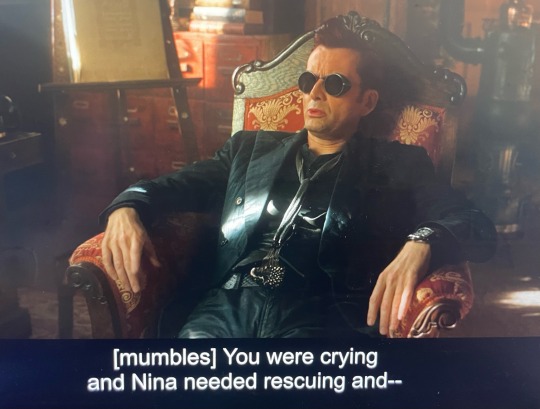
“Nina needed rescuing.” Yeah, you know who else always “needs rescuing”? Anyway, moving on.
Nina says she just got out of a relationship and it would be a disaster to get into another one right away. And then this happens:
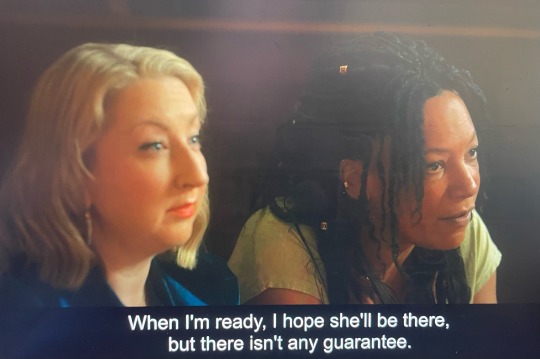
Nina says she hopes Maggie will still be around, but she knows she can’t ask Maggie to just wait while she figures out her own baggage. There's no guarantee. And then Maggie interjects—
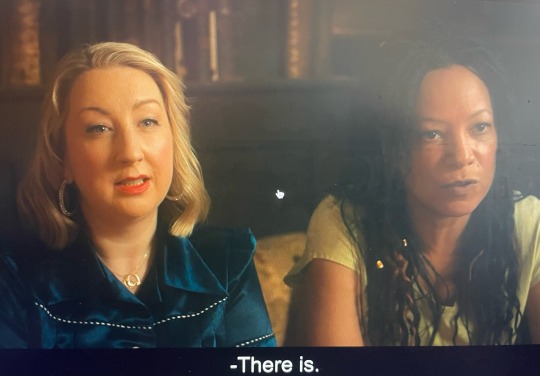
The parallel between Maggie/Nina and Crowley/Aziraphale is so intentional as to feel heavy handed. So what does it mean that we get this exchange in at this particular moment in the script—buried within the conversation which is the catalyst for Crowley confessing his feelings, occurring in the lull immediately before the spectacular dissolution of everything the first two seasons were building towards?
“We could have been us,” Crowley says. Crowley walks out of the bookshop. Crowley turns off their song in his car. Whatever tentative blooming thing has been building between him and Aziraphale for six thousand years appears to be very clearly over. Aziraphale presses the kiss to his lips and knows there is no guarantee they will ever have a chance to be together. There's no guarantee that Crowley will ever want to forgive him, that he will keep on waiting for him.
But.
There is.
#good omens#good omens meta#gos2 meta#gos2 spoilers#reaching for crumbs to tide me over in lieu of a promise of s3#in this case the crumbs are pretty textual though#Neil Gaiman never did meet an instance of parallelism he could resist#I have hope#but Aziraphale is going to have to figure out who he is first#away from Crowley#away from heaven#and he’s going to have to work on himself until he is ready#for the gift of Crowley’s love#ineffable husbands#forgive my super crappy screenshots I don’t have a download of the show#yet
3K notes
·
View notes
Text
Meta Knight gets Dedede a bouquet of roses and Dedede thanks him before immediately starting to eat them
688 notes
·
View notes
Text
I try not to read anti-Zutara takes because like, help, I'm literally here to escape the dark divisive real world. But one point that I see over and over is that there's no time between when Katara forgives Zuko and the end of the series for the dynamic to shift between them.
I always found this kind of a surprising argument (leaving aside all the narrative and thematic groundwork already laid between these two characters, and also the in-show precedent for compressed romantic timelines like Sokka and Yue) because of the Ember Island of it all.
Between the scene where Katara forgives Zuko and the scene when he jumps in front of lightning to save her (both romance-coded visuals), they're living for weeks as unsupervised teenagers in beautiful beach house, emotions running higher than ever as they face down the end of the world as they know it, in a location the story has already told us "has a special way of smoothing even the most ragged edges."
It's kind of hard to imagine a setting or situation with more romantic potential. Except maybe the moment after Katara saves Zuko after he risked his life to save her.
I'm not saying the show cashed in on that potential, obviously. I just mean that one scene with the two of them having a heart-to-heart on the beach late at night or flirting in the surf would have been pretty much all it took.
#I guess in the end all that unrealized potential is still a gift though since it's fed this fandom for almost two decades#zutara#Zutara thoughts#zutara meta#retreating into brainrot to hide from the dark reality
347 notes
·
View notes
Text
being fixated on the same piece of fiction for several years is great because you wind up drilling down to the most fiddly detail shit like:
qin players need their nails to be a certain minimum length on the right hand, to get the proper pluck effect on the string.
however, there's ofc a maximum length the human fingernail can be before you can't grip things firmly without risk of breaking it and/or stabbing yourself, and lan wangji also wields a sword right-handed.
therefore, an essential part of his personal grooming must be frequent self-manicures to keep his nails on one hand exactly the right length, in good condition, and filed very smooth. the latter both because the qin strings are silk and you don't want to snag and because a nail that isn't filed into a clean curve is more prone to catching and tearing, and if he breaks a nail he can't use his ranged music attacks etc.
(also i think having untidy nails would bug him even if it had no practical consequences, and it's arguably against lan sect rules.)
this was especially important to keep up with during the war, when he had to use both implements frequently, and as well as he possibly could.
so lan wangji on the war front, not necessarily managing to keep up his usual standards of hygiene and personal dress (i think the only detail we ever get about him in that period is Wei Wuxian instructing the kid roleplaying sunshot-era hanguang-jun that he was uncharacteristically covered in blood) still carefully trimming and filing the nails of his right hand, every day.
what sort of nail file do you think he owns. what's a historically accurate nail file going to be made of, huh? what's a luxurious historically accurate nail file going to be made of?
you probably could get a nail-filing texture onto jade but i have a hard time believing anyone would.
#hoc est meum#he can cut the nails on his left hand short though! ;)#mdzs#lan wangji#fingernails#meta#yes i was thinking about this while driving today and then was like#what is wrong with you#but also hehehe lan wangji breaking a nail#oh but also: new gift option for wwx unlocked#get him a nail file he can use every day and think of you lmao#less classic than haircare but therefore more personal right?#gentlemanly virtues lmao#get you a man who can do it all#cuticle oil....
162 notes
·
View notes
Text
i briefly mentioned this in a previous post but i really want to talk about how patton’s growth and how he is trying his best to accept remus as part of the sides, because
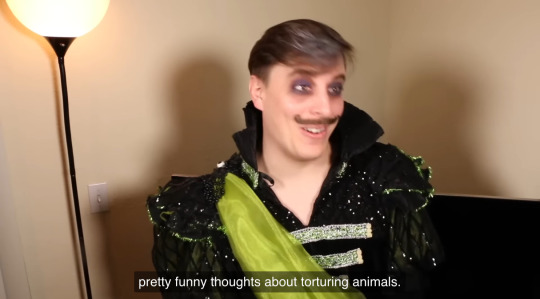
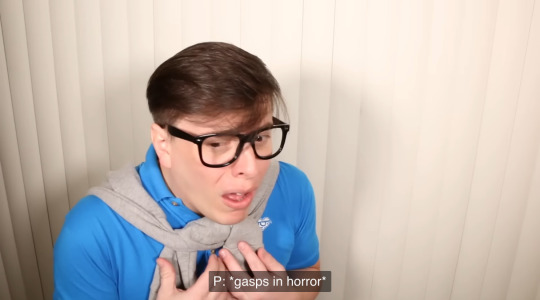
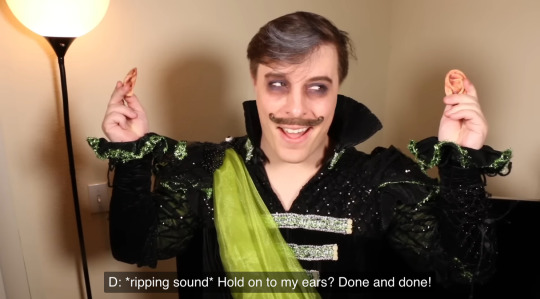

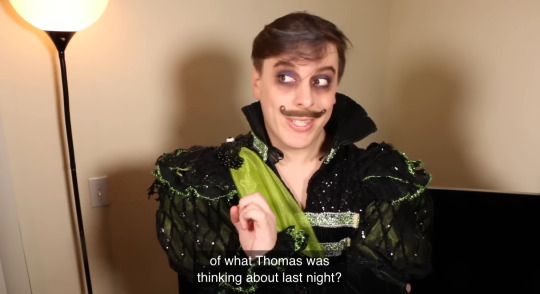
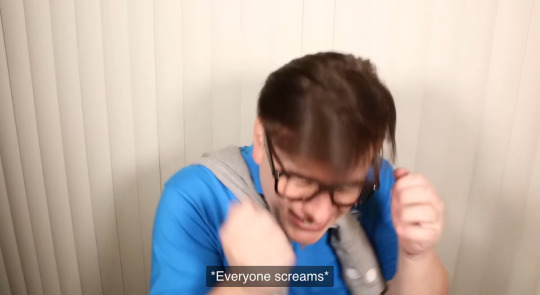
he went from reacting like this to remus’s contributions, screaming or looking visibly horrified or telling remus to stop
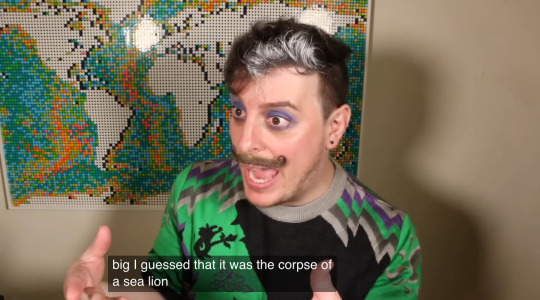
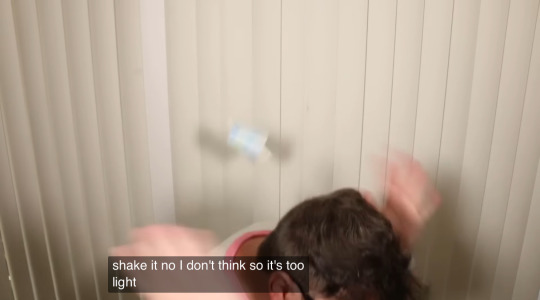
to just casually replying to remus when he suggested that janus might have gifted him a dead animal.
keep in mind, patton is very fond of animals and these are the kind of thoughts that freak him out, but he showed no sign of distress here nor did he reprimand remus for suggesting such a thought. i’m so proud of him, he’s keeping his promise to thomas.
#it’s a very brief blink and you miss it moment#but i noticed it immediately#he might not be entirely on good terms with remus but he has come so far#(and people still say that patton is toxic smh)#sanders sides#thomas sanders#tss#sasi#patton sanders#remus sanders#remus tss#patton tss#tss meta#tss analysis#sanders sides remus#sanders sides patton#sanders sides meta#sanders sides analysis#i guess you could say that maybe patton was too excited about the gift that he didn’t really pay attention to remus#but i don’t think that’s true#patton never misses these kind of things
411 notes
·
View notes
Text
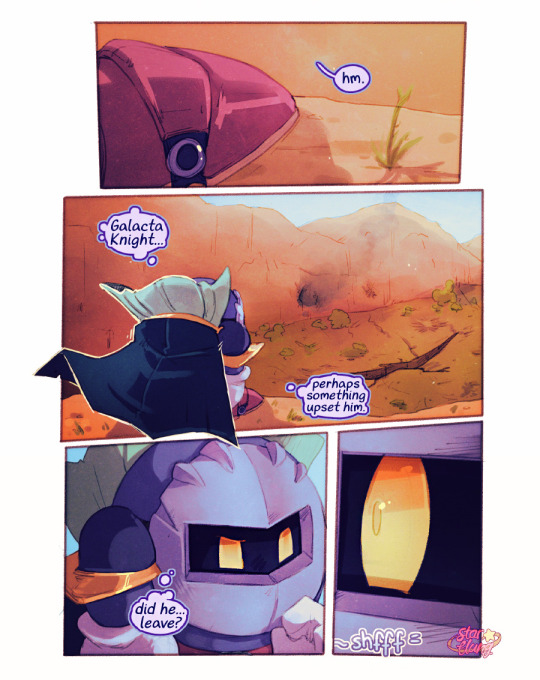
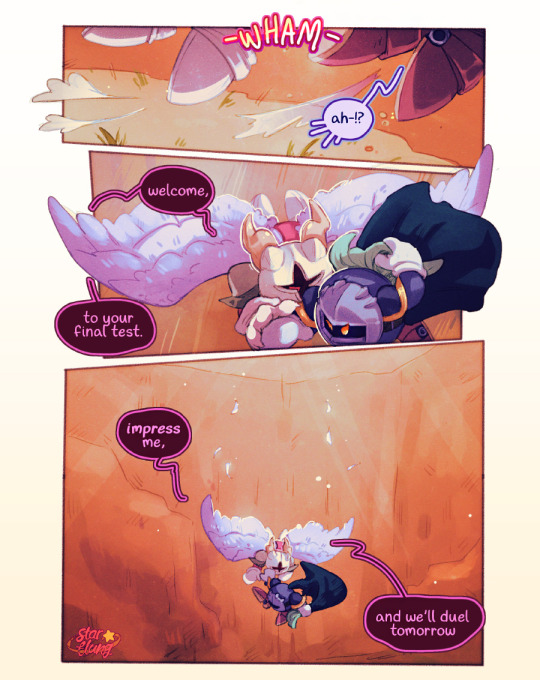
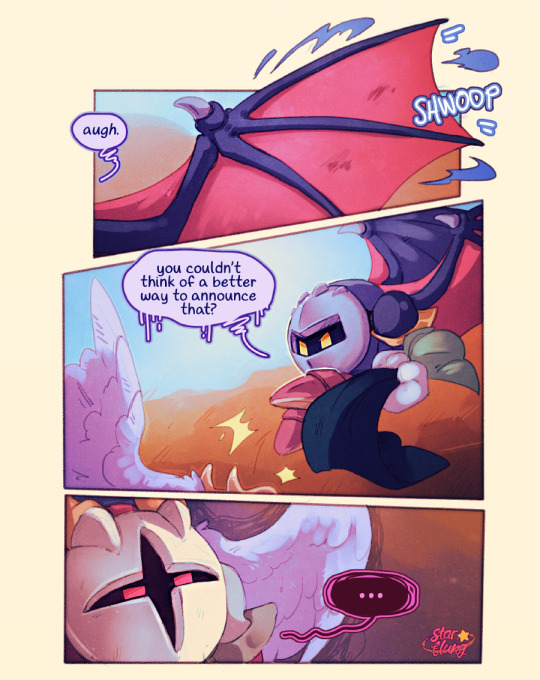
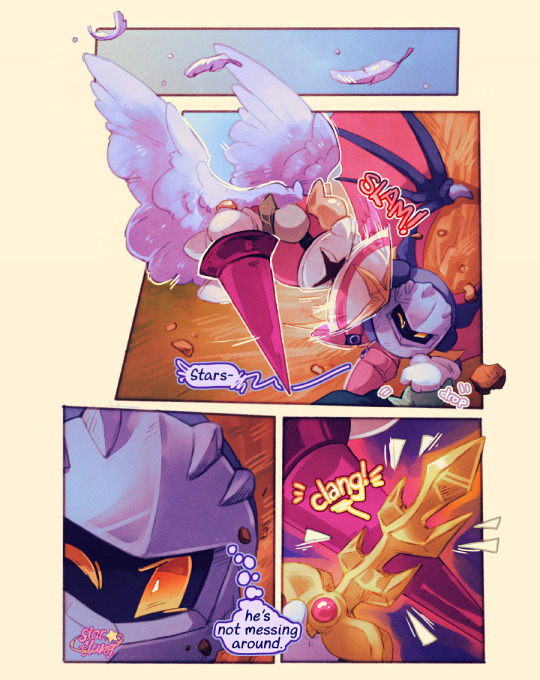
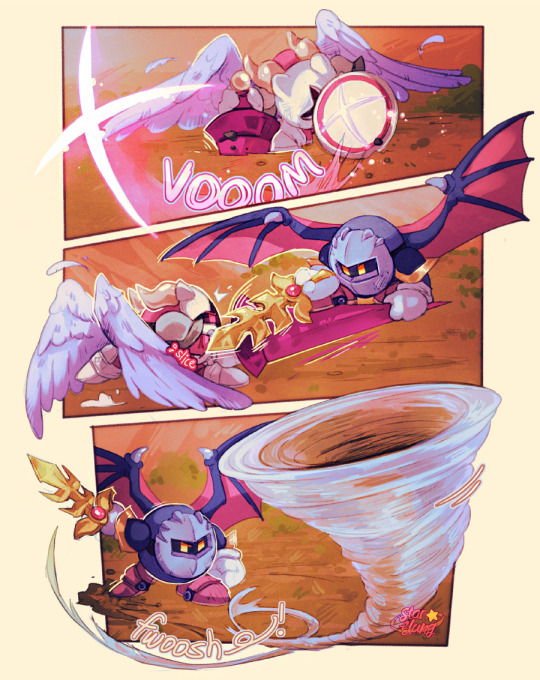
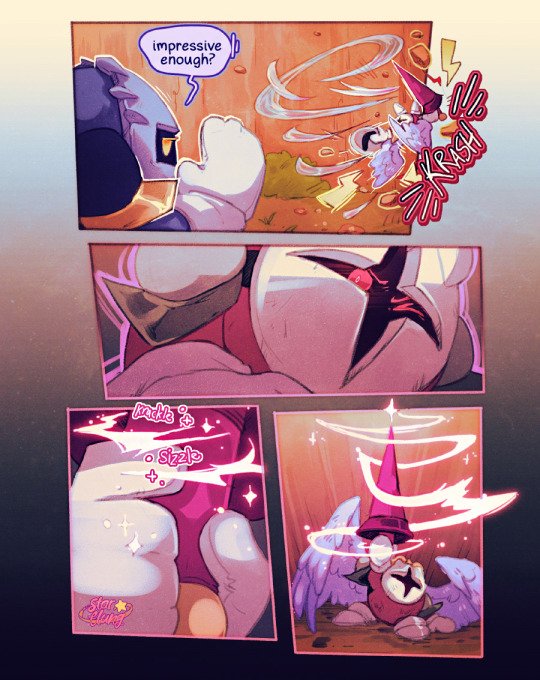
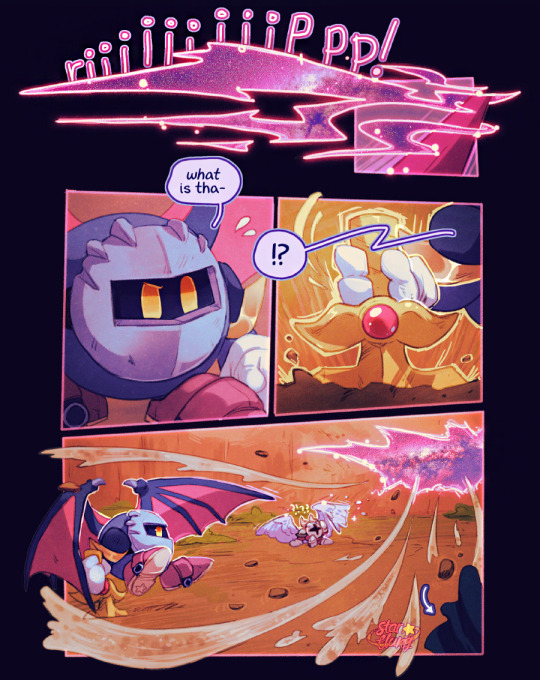
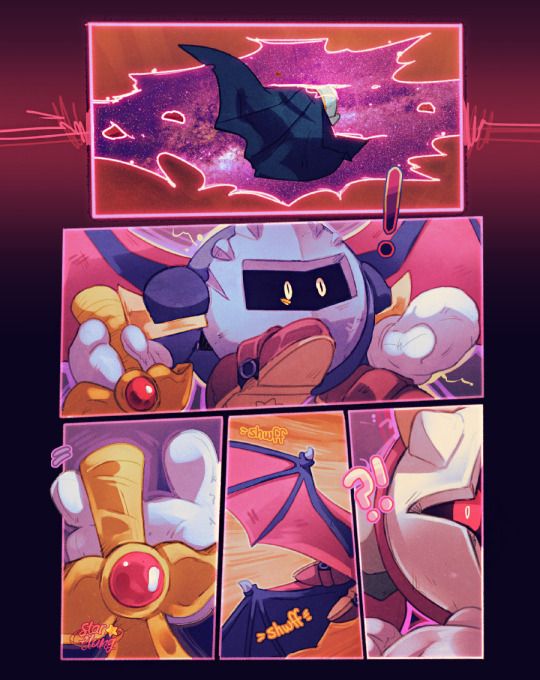
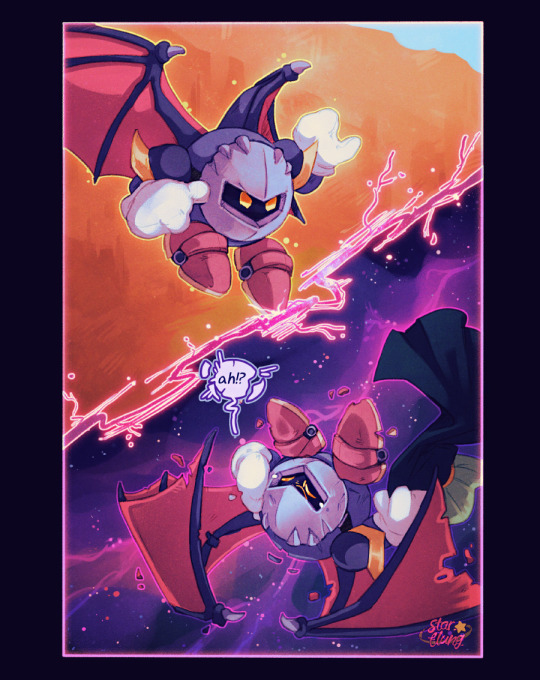
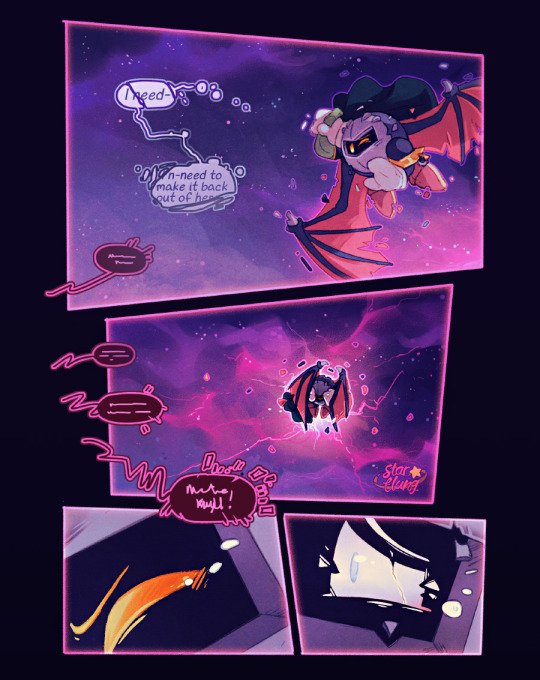
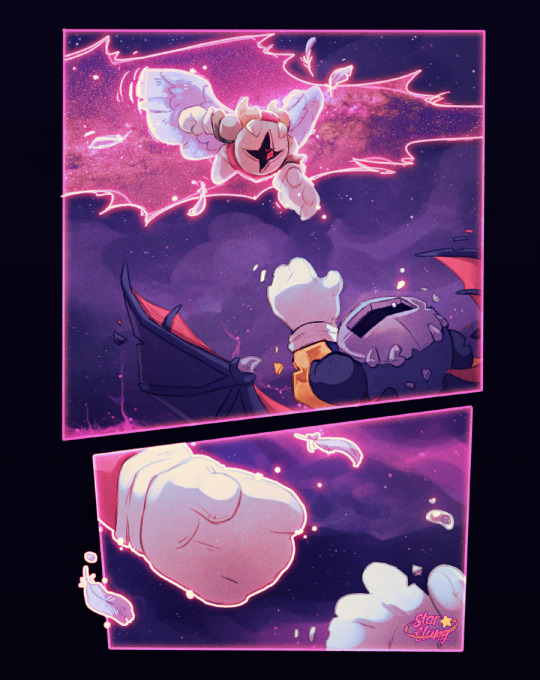

from: @starflungwaddledee to: @post-it-notes7
message from santa: "happy holidays post-it-notes! 🎄🥳 i know you very politely only wished for a few modest things- characters high fiving, or struggling in christmas attire- but i hope you'll still enjoy this given that i kinda went the opposite direction entirely! i'm an enormous fan of your work and most times you post anything i wind up browsing your art tag from tip-to-tail in enraptured delight. as such, i thought it was only fair i give back something a little more significant in gratitude for all the joy your work has given me. i knew i wanted to do a comic, so i was thrilled you already had a whole storyverse for me to work from!! this scene seemed the most obvious choice (chapter 8 of "wishful thinking" on ao3) given that i enjoy a dramatic fight scene 😂 i tried to stick as beat-by-beat to the writing as i could and worked in as many details as possible; i hope it'll be fun to see it envisioned this way! merry christmas! ~starflung 🎀🔔 "
#phew... this is by far the most ambitious piece i've ever posted here! 12 pages! this is why i've been so afk from other work haha!#shout out to the poor mods who sent through assignments and received no small amount of all-caps panicked screaming from me in response!!#me?! draw a gift for THE post-it-notes7!? immediately knew i had to overachieve to stand any hope of being up to the bar haha#if you feel these characters look a little different to how i usually draw them- that's totally on purpose!#i worked really hard to match post's designs and styling for them rather than my own; seeing as this was a gift!#actually think it stands out a *lot* surprisingly- given that they are still the exact same orbs. really interesting to compare to my usual#i hope some folks will notice all the details from the story in here! if you've read it and you recognised it please let me know!#genuinely hoping someone just recognises it on the first page. iconic canyon fight... what an honour to draw for this fic tbh#also thank you to the mods for handling all the wips and progress on this ridiculously sized entry from me with such grace#it's being posted on my personal blog due to length for anyone wondering. should be seamless... fingers crossed.#my art#my comics#meta knight#galacta knight#hnk secret santa#cw violence
921 notes
·
View notes
Note
cheeto dust to dust
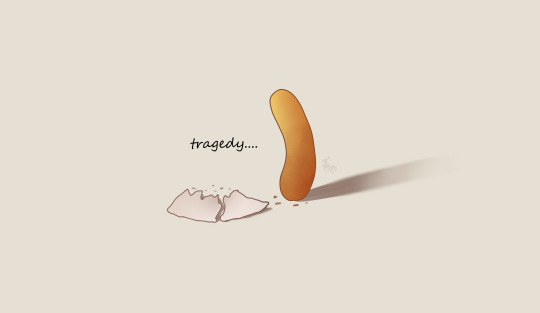
.
#okay getting pretty meta now#this can't be happening#you can't make me feel sorry for a pair of salty snacks that's not fair#gift art#jeastoks#Machete#Vasco#lying in bed and frowning
765 notes
·
View notes
Text
BEHOLD, MY ACTUAL FINAL DESIGN FOR MY META KNIGHT GIJINKA!



#FINALLY#I HAVE A SOLID DESIGN FOR HIM#o and i think im getting the hang of digital art :3c#meta knight#morpho knight#kirby#kirby fanart#kirby gijinka#digital art#my art#nchidencfiencuidency9fedw i love the armor#enjoy my friends- i gift you big strong bulky man with claws and a death glare
1K notes
·
View notes
Text
A few interesting parallels in the SoC duology that I don’t think I’ve seen anyone talk about yet
(Analysis/discussion of these parallels/quotes may come later if anyone's interested)
“These creatures were made to be weapons” - Jarl Brum on Grisha, Six of Crows chapter 35
“He looked like what he truly was: a weapon” - Jesper Fahey on the Khergud, Crooked Kingdom chapter 36
“Welcome to the Hellshow” - Kaz to Nina, Six of Crows chapter 6
“Welcome to the Ice Court, Nina Zenik” - Matthias to Nina, Six of Crows chapter 34
“Is this a play?” - Alys Van Eck “Yes love, and you’re the star” - Jesper Fahey, Crooked Kingdom chapter 8 when Alys is taken captive
“What was this but a play Kaz had staged, with that poor sucker Kuwei as the star?” - Jesper Fahey on the auction plan, Crooked Kingdom chapter 36
“he looked like a priest come to preach to group of circus performers” - Inej on Kaz’s appearance in comparison to the rest of the Barrel, Six of Crows chapter 2
“started to preach” - Inej on Kaz leading a coup against Per Haskell, Crooked Kingdom chapter 27
“Whoever he had become, Matthias was not going to shoot someone unarmed. He'd not yet sunk so far” - Matthias Helvar, Six of Crows chapter 29
“I am unarmed” - Matthias Helvar, Crooked Kingdom chapter 38
"I didn't even know the rules of Makker's Wheel" - Jesper Fahey on his first night gambling in the Barrel, Six of Crows chapter ()
"He knew his guns better than he knew the rules of Makker's Wheel" - Jesper Fahey on the concept of aim and its relationship to his life and his zowa/Grisha abilities, Crooked Kingdom chapter 36
“a tiny voice inside him said he should offer to take the drug as well […] maybe he could have helped to draw the parem out of Nina’s system and set her free. But that was a hero’s voice and Jesper had long since stopped thinking he had the makings of a hero” - Jesper Fahey, Six of Crows chapter 44
“Matthias gave you the remaining parem, didn’t he?” “So?” “[…] I can’t let my father down again. I need the parem as a security measure” “No” “Why the hell not?” - Jesper and Kaz in discussion about the auction plan, Crooked Kingdom chapter 30
I'll probably be back to add more, feel free to add your own as well
#prepared to cry every time the unarmed quotes come up omg#and i love parallels we all know that but also#another thing from chapter 36 that we do not talk enough about#'it's not a gift it's a curse' but when it came down to it Jesper's life had been full of blessings#His father his mother Inej Nina Matthias leading them across the muddy canal#Kaz even Kaz#with all his cruelties and failings had given him a home and a family in the dregs when Ketterdam might have swallowed him whole#and wylan#wylan who had understood before Jepser ever had that the power inside him might be a blessing too#like this quote????????#it's so underrated?????????????#in fact stay tuned because now that I'm thinking about it it's probably about to get its own post#six of crows#crooked kingdom#grishaverse#jesper fahey#leigh bardugo#kaz brekker#inej ghafa#wylan van eck#nina zenik#matthias helvar#soc meta#six of crows analysis#kanej#wesper#helnik#this has been in my drafts for months and months and months literally just because i couldn't be bothered to find the chapter references lo
151 notes
·
View notes
Text
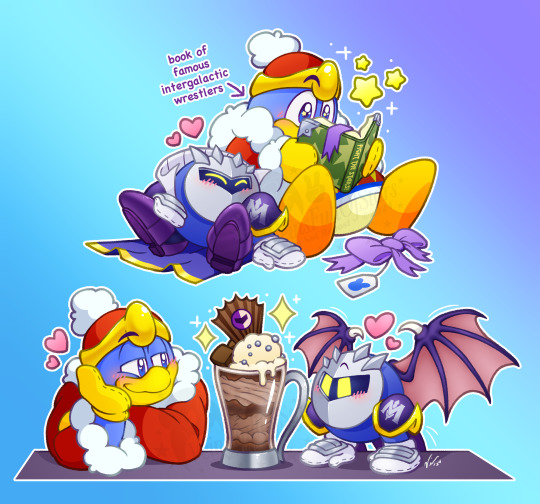
💝 MetaDede Week 2024 Day 3: Gifts 💝
(ID: Kirby series fanart of King Dedede and Meta Knight giving each other a gift. Top - the boys sitting side-by-side, MK looking up with a pleased smile behind his mask as DDD excitedly flips through a green leather-bound book the knight has given him, the spine titled “Fight the Stars!” and an arrow pointing to it that says “book of famous intergalactic wrestlers.” Bottom - the boys seated at a table, a chocolate parfait in a large handled glass between them, the treat layered with fudge, mousse, and ice cream, topped with brownie bites, edible silver pearls, and a fanned wedge of chocolate emblazoned with MK’s mask. MK, delighted by the gift, leans forward with wide eyes and spread wings, practically leaping onto the table in his eagerness to dig in, while DDD reclines with his elbow propped up and his head resting in his hand, gazing at the knight with a soft smile. END ID.)
Parfait inspired by various MK-themed desserts from the Kirby Café.
Previous Day | Next Day | Prompt List (made by @/mtddweek)
Started 08/11/24, finished 08/16/24.
#veins art#veins ships#veins fanart#kirby series#kirby#king dedede#meta knight#king dedede x meta knight#metadede#mtddweek2024#day 3#gifts#nothing quite like sharing your interests with the ones you love 💕#I like to think they spoil each other (when they’re on good terms)#DDD using any occasion he can to get the workaholic knight to eat *something*#(even if it means running the kitchen 'Dees ragged or ransacking the royal coffers just to get him his favorites)#MK knows he can always win his king over with food… but sometimes he prefers a *challenge* in his courting#after all it's very rare for a book to win DDD over#but MK’s always been a good observer#and he’s had plenty of time to learn what makes his king happy#(not that the whole Masked Wrestler aesthetic is a hard one to miss haha)#food tw#veinsfullofstars
184 notes
·
View notes
Text
ideal careers for barty crouch jr besides being a domestic terrorist:
line cook
heretic
slutty eurotrash dj
eccentric, dexterous 1890s safecracker enlisted in a high-stakes heist to steal the queen’s diamonds
the guy that people mean when they say “i know a guy” in mafia movies
STUNT MAN
2000s pop-punk emo band frontman with pictures of his crotch on myspace
manipulative high society victorian-era celebrity hypnotist famous for “causing” somnambulism at his “shows”
electrician (thanks lune)
engineer, but specifically the one behind the infrastructure used in risky motorcycle stunts
slutty eurotrash club promoter
the sound-effects foley guy for b-roll action movies who is always walking around w/ headphones and holding one of those skinny boom mics
house husband
ideal careers for regulus black besides being a failed domestic terrorist:
the sullen, withholding renaissance-era muse of a tortured artist, posing in place of the angels, his enigmatic yet eerily beautiful portrait immortalized forever on the ceiling of a cathedral
critic of any kind (professional hater)
surgeon at a hospital for stuffed animals
a broken man, unfixable. a fool, hated by all, exploited till death. only in this way will he be redeemed
cunty benedictine monk
#ARGUE WITH THE WALL#barty meta tag#actually. teacher should be on here. i feel like that’s the one profession we know definitively that he’s good at#the fact that he’s a gifted teacher and actor……….. he was so so precious. the main character#saints speaks 🐇
371 notes
·
View notes
Text
unhinged that gabriel had such a heartbreaking reaction to beelzebub giving him something because noone had given him anything before, because now it's got me thinking about angels existing in an environment and under a regime where you don't really have anything to call your own - all your own. so what potentially did crowley first give to aziraphale to call his own and what book do you think it was
#half arsed meta bc i dont necessarily subscribe to this in any seriousness#and crowley has done A Lot of non material things for aziraphale - given him gifts that arent necessarily objects#but this thought worm wouldn't leave#good omens
672 notes
·
View notes
Text
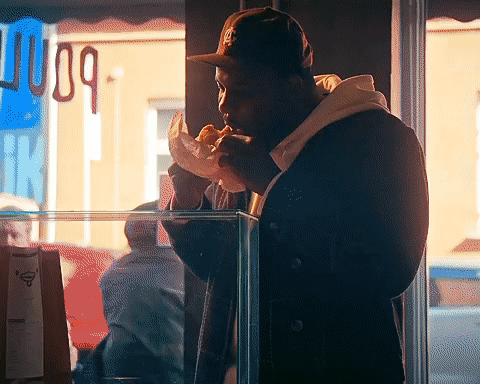
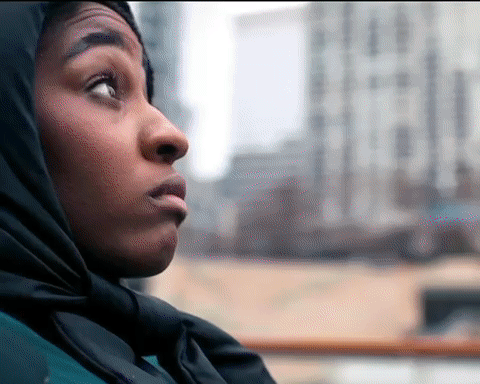
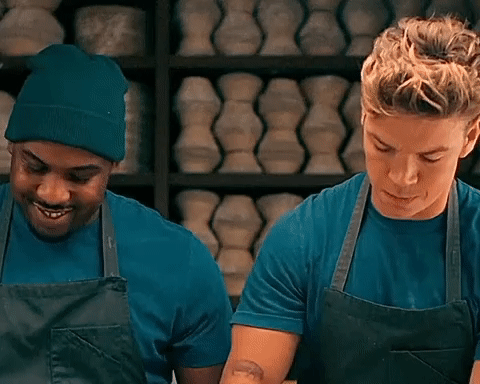

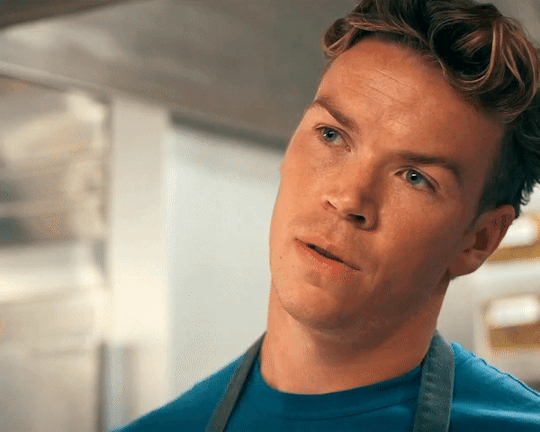

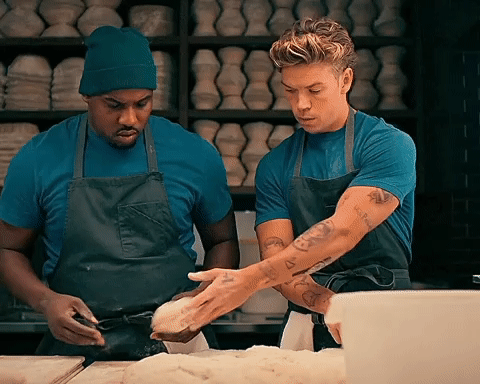
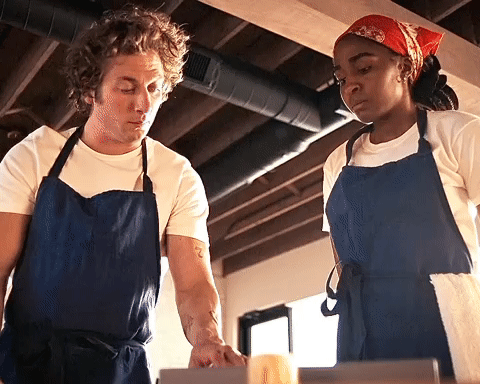

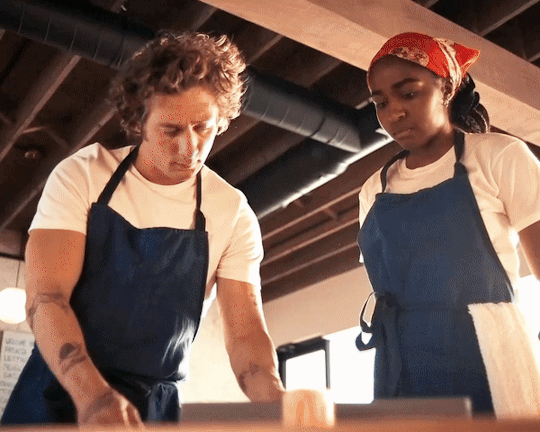
The Sydcarmy + Lucus parallels
#the matching fits#the gifts#inspo run#the chemistry ✨#lucus#sydcarmy#the bear#sydney adamu#carmen berzatto#the bear meta#marcus x luca#carmen x sydney#marcus brooks#the bear luca#will poulter#lionel boyce#ayo edibiri#jeremy allen white
957 notes
·
View notes